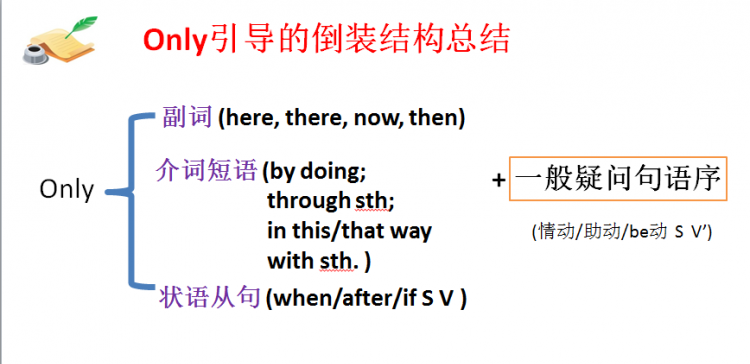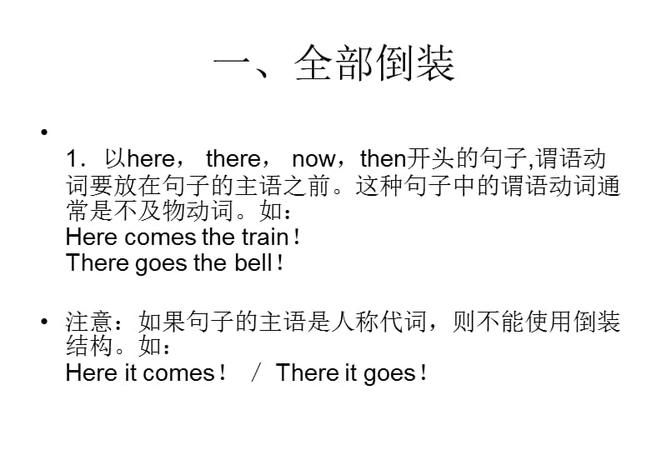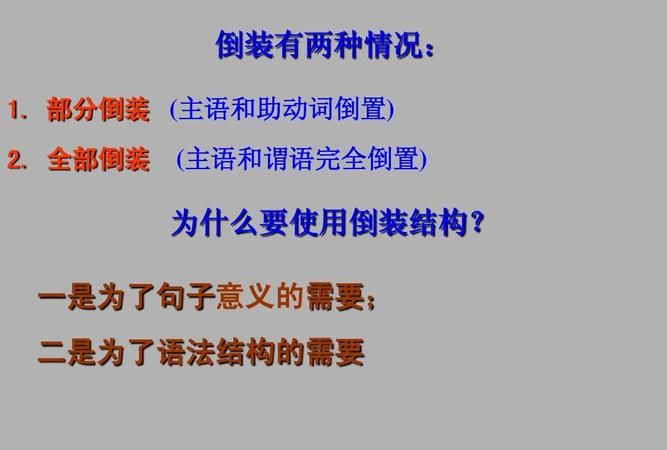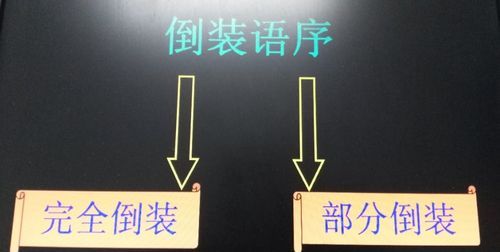本文目录
全倒装与半倒装的区别
全倒:
1 表语置句首
adj.+link verb+subject...
例句:Present at the meeting were XX and XX.
分词+link verb
Gone are the days when ...
2 There be句型(不用例子了吧?)
3 直接引语的部分或全部在句首
例句:"Is it ready yet?"asked my father.
4 在表示方向、地点的副词或某些介词词组开头的句子(介词如there,here,out,in,up,down,away,in front of,now,then,off等,地点如south of the city,to the north of the city)
例句:There goes the bell.
Under the tree stands a boy.
Away went the boy.
In front of the house was a small garden.
但是如果主语是人称代词(I,you,he she,it,they,we)主语和谓语顺序不变,也就是半倒装。
例句:Here it is.
Here you are.
Away he went.
5 表示祝愿的句子中
例句:Long live the PRC!
May you have a happy day!
半倒
1 as取代though的让步状语匆遽,引起的句子成分提前
例句1(表语提前):Poor as he is,...
例句2(表语提前,去掉a):Baby as he is,...
例句3(状语提前):Hard as he worked,...
例句4(谓语提前,可保留情态动词):Try as he may,...
2 疑问句中的提前,借助助动词、情态动词提前(不用例子了吧?)
3 含有否定意义的词语在句首(否定词有never,not,not only,little,seldom,hardly,few,nowhere,scarcely,neither,nor,no longer,not untill,not once,in no way,in no case,ar no time,no sooner than,hardly when等等)
特别注意,in no time 的意思是马上,不含否定意思,因此它置句首句子不倒装!!!
例句:Not only was there no electricity,but also no water.
Never will he forgethis ferst time to take a plane.
Hardly had I got out of the house when it began to rain.
4 Only修饰的副词、介词短语或状语从句置句首时
例句:Only then did I begin my work.
Only if you ask many different questions will you acquire all the information.
Only in this way can you learn from your friends.
5 so,neither,nor引起的句子,表示前面的情况也适合另一人或同一人的另一情况时。
例句:My sister enjoys travelling. So do I.
I don't know and nor do I care.
前后的谓语要保持时态一致。
如果前面主句中既有谓语动词又有系动词,或者一半肯定一半否定,则用句子So it is/was with sb.
6 在so/such...that...结构中,so/such放句首时
例句:So proud was he that he never listened to any advice.
Such a kind person is he that...
7 虚拟条件从句省略if时(只有if后面跟should,had,were时可省略if)
例句:Should you need more information,please let me know.
Had Mark invited me I would have been glad to come.
我所总结的都是高中阶段的语法……你的问题就9个字,我可打得辛苦死了呢!求分求分求分……

英语中完全倒装和部分倒装的区别
倒装
英语句子的语序通常是主语在前,谓语在后,这种语序称作正常语序或自然语序。但有时出于语法或达到某种修辞目的(强调、承上启下、平衡等)的需要,要把谓语动词放在主语前面,这种语序称作倒装(Inversion)语序。将谓语动词完全移至主语之前,称完全倒装(Full Inversion);如果只是把助动词或情态动词放在主语之前,称为部分倒装。
1. there be结构的倒装
在“there be”(或there + appear to be,come,exist, happen to be, lie, live, occur, remain, seem, seem to be, stand, used to be) 雪结构中,倒装形式为完全倒装。如:
There were many students in the reading room in this evening.
今晚阅览室里有许多学生。
There is a TV set, a stereo system and a number of chairs in the sitting room.
客厅里有一台电视机,一套组合音响和一些椅子。
2. here,there,now,then等引起的倒装
在以here,there,now,then等简短副词引起的句子中(前三个须用一般现在时),动词往往是be,come,go等时, 这类句子大多带有引起注意的含义。如:
Here comes the bus.
公共汽车来了。
Here is the letter you have been looking forward to.
你久盼的信在这儿。
但要注意:如果主语是人称代词,则不用倒装。如:
Here they are. 他们在这儿。
3. 省略if的非真实条件状语从句中的倒装
虚拟结构中的条件从句省去if时,were, had, should须移至主语之前。如:
Had you worked harder at college, you would have got better job.
如果你在大学期间读书用功些,现在就会找到一份更好的工作。
Were he better qualified, he would apply for the position.
要是他的条件再好些,他就申请这个职位。
4. 副词so, neither, nor等引起的倒装
在用so, nor, neither表示“也/不……”这一类结构里其公式是:
肯定: so+be/have/助动词/情态动词+主语
否定: Neither(nor)+be/have/助动词/情态动词+主语。如:
—He has been to Beijing.他去过北京。
—So have I.我也去过。
—They can’t answer the question.他们不会回答这个问题。
—Neither than I.我也不会。
5. what,how引起的倒装
以What, how开头的感叹句(表语或宾语提前)。如:
What beautiful weather (it is)!
多好的天气啊!(表语提前)
What a lovely picture he painted!
他画了一张多好的画啊!(宾语提前)
6. 疑问词或连接词引起的倒装
在疑问词或连接词whether等引起的从句中。如:
Whatever you may say, I won’t go there.
无论你怎样说,我都不会去那儿。(状语从句中宾语提前)
What book he wants is not clear.
他要什么书还不清楚。(主语从句中宾语提前)
7. 否定词位于句首时引起的倒装
(1). never,seldom,hardly,little,few等引起的倒装
否定词never,seldom,rarely,hardly,barely,scarcely,little,few等位于句首时所引起的倒装句通常为部分倒装形式,如果谓语动词为be的一般现在时或一般过去时,则为完全倒装形式。如:
Never shall I forget the days when you were with us.
我很少有时间去看电影。
(2). nowhere,no longer,no more等引起的倒装
nowhere(无处),no longer(不再),no more(也不)等否定词位于句首时所引起的倒装句通常为部分倒装形式,如果谓语动词为be的一般现在时或一般过去时,则为完全倒装形式:
No longer was he in charge of this work.
他不再负责这项工作了。
(3). not until,not a,not in the least等引起的倒装
not until(直到……才),not a(一个……也没有),not in the least(一点儿也不),not for a minute/moment(一点儿也不)等位于句首时,通常引起倒装(not a之后的名词作主语时除外),其形式通常为部分倒装形式,如果谓语动词为be的一般现在时或一般过去时,则为完全倒装形式。如:
Not until all the demands had been turned down did the workers decide to go on strike.
一直到所有的要求遭到拒绝之后,工人们才决定罢工。
Not once did he talk to me.
他一次也没有和我谈过。
(4). under no circumstances,by no means,in no way等引起的倒装
in/under no circumstances(无论如何不),by no means (决不),in no case (无论如何不),in no way (决不),on no account (决不可),on no condition(决不)等短语位于句首时所引起的倒装句通常为部分倒装形式,如果谓语动词为be的一般现在时或一般过去时,则为完全倒装形式。如:
In no case must force be resorted to.
决不准许诉诸武力。
By no means is it true that all English people know their own language well.
并非所有的英国人都通晓本国语。
8. 关联连词位于句首时引起的倒装
(1). not only...but also引起的倒装
not only...but also位于句首所引起的倒装句为部分倒装形式,如果谓语动词为be的一般现在时形式或一般过去时形式,则为完全倒装形式。如: Not only should we not be afraid of difficulties, but also we should try our best to overcome them.
我们不仅应该不怕困难,而且应该尽最大努力去克服它们。
(2). neither...nor引起的倒装
neither...nor位于句首引起的倒装句为部分倒装形式,如果谓语动词为be的一般现在时或一般过去时,则为完全倒装形式。如:
Neither Peter wanted the responsibility,nor did his wife.
彼得不想担此责任,他妻子也不想担此责任。
(3). hardly...when/no sooner...than引起的倒装
hardly/scarcely/barely...when或no
sooner...than位于句首所引起的倒装句为部分倒装形式,如果谓语动词为be的一般现在时或一般过去时,则为完全倒装形式。如:
Hardly had he arrived when/No sooner had he arrived than he was asked to leave again.
他刚到就又被请走了。
(4). so...that引起的倒装
so...that位于句首所引起的倒装句为部分倒装形式,如果谓语动词为be的一般现在时或一般过去时,则为完全倒装形式。如:
So angry was he (He so angry) that he couldn’t speak.
他如此愤怒,以致说不出话来。
(5). such...that引起的倒装
such...that位于句首所引起的倒装句为部分倒装形式,如果谓语动词为be的一般现在时或一般过去时,则为完全倒装形式。如:
Such was the force of the explosion that all the windows were broken.
爆炸的威力如此之大,以致所有的窗户都被震破了。
9. only引起的倒装
当副词only位于句首并修饰状语或宾语时,引起句子的倒装,其形式通常为部分倒装,如果谓语动词为be的一般现在时或一般过去时,则为完全倒装。如:
Only in this way can you solve this problem.
只有用这种方法,你才可以解决这个问题。
Only yesterday did I finish this the book.
到昨天我才读完那本书。
10. 表语位于句首时所引起的倒装
当作表语的形容词、副词、介词短语等位于句首时,常常引起倒装,其形式为完全倒装:
Aristotle says,“Plato is dear to me,but dearer still is truth.”
亚里斯多德说,“吾爱柏拉图,但更爱真理。”
Present at the meeting were Professor Smith,Professor Brown,Sir Hugh and many other celebrities.
到会的有史密斯教授、勃朗教授、休爵士以及许多其他知名人士。
11. 状语位于句首时所引起的倒装
(1). 当位于句首的状语是一些表示地点的介词短语或表示运动方向的副词(如away,back,down,in,off,out,up)时,常常引起倒装,其形式为全部倒装。如:
Away went the runners.
赛跑手们刷地跑开了。
Down came the rain.
雨哗地落下来了。
(2).介词短语作地点状语,放在句首,后面跟的是不及物动词be,come,sit live,stand,lie,exist等时常常引起倒装,其形式为全部倒装。如:
Next to the table is a chair.
桌旁有把椅子。
At the South Pole lies Antarctica, the coldest and most desolate region on earth.
南极洲位于南极,它是地球上最寒冷和最荒凉的地区。
12. 状语从句中的倒装
(1).让步状语从句中的倒装
as引导的让步状语从句中的倒装:
在as引导的让步状语从句中,位于句首的可以是形容词、名词、副词,还可以是谓语动词的一部分,从而形成从句的部分倒装。如:
Tires as he was, he continued the work.
虽然他累了,但是仍然继续工作。
(2).方式状语从句中的倒装
as引导的方式状语从句一般为正常语序,但是,如果主语比谓语长,可将谓语动词置于主语之前,形成完全倒装。如:
He believed,as did all his family,that the king was the supreme lord.
他和他全家人一样,都认为国王是至高无上的君主。
(3).比较状语从句的倒装
than引导的比较状语从句中的倒装:
由than引导的比较状语从句一般为正常语序。但是,如果主语较长,可将谓语动词置于主语之前,形成完全倒装:
Western Nebraska generally receives less snow than does eastern Nebraska.
内布拉斯加西部地区的降雪通常比东部地区少。
13. the more...,the more...结构中的倒装
在以the more..., the more...引导的倒装结构中,采用部分倒装;如果主句的主语较长,可将谓语动词置于主语之前,形成完全倒装。如:
The more books you read(宾语提前),the wider your knowledge is(表语提前).
书读得越多,知识就越渊博。

倒装句全倒装和半倒装的区别
倒装是一种语法手段,用于表示一定的句子结构或强调某一句子成分。倒装句有两种:完全倒装和部分倒装。
1. 完全倒装
1) 完全倒装即把整个谓语放到主语之前(是整个谓语动词,而非助动词)。
例如:In came the teacher and the class began. (老师走了进来,然后开始上课。)
2) there引出的完全倒装句:除了最常见的there be句型以外,there还可以接appear, exist, lie, remain, seem to be, stand等,一般都译成"有"的含义,构成完全倒装句。
例如:There appeared to be a man in black in the distance.(远处有个穿黑色衣服的人。)
3) 由地点和时间副词引出的完全倒装句:以地点副词here, there和时间副词now, then 开头,后面的动词是be, come, exist, fall, follow, go, lie, remain, seem, stand等,而主语又是名词时,构成完全倒装句。Up climbed the boy when his mother came.
4)表示运动方向的副词或地点状语置于句首,谓语表示运动的动词且主语是名词时使用
2. 部分倒装
1) 部分倒装即只把谓语的一部分(如助动词、情态动词等)放到主语前,或把句子的强调成分提前。
例:_______ right now, she would get there on Sunday.
A) Would she leave B) if she leave
C) were she to leave D) If she had left
结合选项,全句的意思是:“如果她立刻就走,她就能在星期天到达那里”。答案是C。
2) 以否定词开头的句子要求部分倒装。注意下列句子中助动词或情态动词提前、甚至补充助动词的用法:
例:Not until yesterday did little John change his mind.(小约翰直到昨天才改变了主意。)
例:In no country ______ Britain, it had been said, can one experience four seasons in the course of a single day.
A) better than B) more than C) other than D) rather than
本题是个倒装句,答案是C) other than。no other than意思是“正是、就是”;而rather than的意思是“宁愿……而不……;而不是”。
3) 以否定副词开头并加状语的句子要求部分倒装。这些否定副词有barely, hardly, little, seldom, scarcely…… when, never, no sooner…… than, rarely, no more, nor nearly, not only等以及only。
例:Only under special circumstances _________ to take make-up tests.
A) are freshmen permitted C) permitted are freshmen
B) freshmen are permitted D) are permitted freshmen
全句的意思是:“一年级学生只有在特殊的情况下才可以允许补考。”本陈述句以only开始,后面接状语,应当用部分倒装句。所以答案是A) are freshmen permitted。如用自然语序,本题所在的句子就应该改写为:Freshmen are permitted to take make-up tests only under special circumstances.这两句话的差别是,前者将only under special circumstances放到句首,表示对状语的强调。注意:在部分倒装句中,只有助动词、情态动词或连系动词to be可以置于主语之前,其它部分都要置于主语之后。
注意:
a) 如果含有从句时,只要求主句倒装:
例:Only after he had spoken out the word did he realize he had made a big mistake.(只有当他已经说出那个字后才意识到自己犯了个大错误。)
b) 如果上述否定副词出现在强调句型中的前半部分,不用倒装:
例: It was not until he went abroad that he know the truth of the fact.(直到他出国以后才了解到事实真相。)
c) 如果hardly, scarcely后面接的是any, ever, at all时,意义类似almost no/ not/ never(几乎不、从不),则无须倒装。
例:Hardly any people having been invited went there.(几乎没有什么受到邀请的人去那里了。)
4) 由no matter how, however和how引导的状语从句要求部分倒装,因为形容词或副词通常紧跟在这三个引导词后面,然后才是主语和谓语,形成形式上的部分倒装句:
例:I know nothing about this river, neither how long, how wide nor how deep it is.(我一点也不了解这条河,不知道它有多长,多宽或多深。)
由as引导的部分倒装句:
a) 当as作为比较意义时,即用于as + adj./ adv. + as结构中时,如果把第一个as省略掉,就形成部分倒装句。
例:Cautious as the rest of her family (was) , she didn't seem willing to give an immediate reply to my question.(正如她家里人一样谨慎小心,她似乎不愿意立即回答我的问题。)
She ran down the stairs, quick as a rabbit (ran).(她跑下楼去,跑得象兔子那么快!)
b) 当as引导让步状语时,和although, though一样,当用作“尽管”之义时,可以用于部分倒装句。
例:_______, there was no hope of her being able to sleep.
A) As she was exhausted B) If she was exhausted
C) Exhausted though she was D) Now that she was exhausted
答案是C) Exhausted though she was。从属连词as, though可以用于让步状语从句中。这种从句必须以形容词(或形容词化的分词)、名词或动词原形开头,主语必须位于从句之后。D) Now that she was exhausted里的引导词Now that表示“既然”;B) If she was exhausted表示条件“如果”; A) As she was exhausted表示“由于”(因为使用的是正语序),都与后面句子的意思不通顺。
c) 表示原因时,为了强调起见,也可以倒装。
例:Tired as he was, we decided not to disturb him.(因为他太累了,我们决定不打扰他。)
d) 等于so时,意义是“也,也是”
例:She worked hard, so/ as did her husband. (她工作很努力,她的丈夫工作也很努力。)

全倒装和半倒装公式
正常语序是主+谓+宾,谓语在主语后面 而倒装语序是谓语在主语的前面
Here is a photo of my family.这个句子中主语是a photo,谓语是is 正常语序是 A photo of my family is here .属完全倒装
Here it is.这个句子中主语是it,一般来说,当地点副词或状语位于句首的时候,句子就采用完全倒装,本句 here是副词, 本来需要完全倒装,但因为有代词it 所以不倒装,但当主语是代词时不完全倒装 正常是It is here
"It great" says she .主语是she,谓语是says,完全倒装,正常语序是She says "It great"

以上就是关于全倒装和半倒装公式 ,全倒装与半倒装的区别的全部内容,以及全倒装和半倒装公式 的相关内容,希望能够帮到您。
